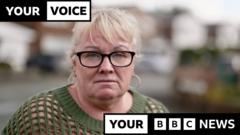Are Shared Houses the Solution to Locals' Anger Over Asylum Hotels?

Published: 2025-09-09 05:07:03 | Category: technology
This article explores the complexities surrounding asylum seeker accommodation in towns such as Warrington and Wigan, where local residents express frustration and concern over the impact of asylum hotels and houses in multiple occupation (HMOs) on their communities. As the government plans to close asylum hotels, there are fears this will only shift the problem rather than solve it.
Last updated: 20 October 2023 (BST)
Key Takeaways
- Local protests arise against asylum hotels, with residents voicing safety concerns.
- The government is considering closing asylum hotels and increasing the use of HMOs.
- Many residents feel their voices are not heard in the decision-making process.
- Asylum seekers express gratitude for their accommodation but face stigma from locals.
- Statistics indicate a significant rise in HMOs housing asylum seekers in recent years.
The Rising Tension in Communities
In recent months, towns like Warrington and Wigan have become focal points of a heated debate surrounding the accommodation of asylum seekers. Local residents express heightened anxiety over their safety and the implications of housing policies directed from government authorities. As some residents engage in peaceful protests against the use of hotels for asylum seekers, others within the community grapple with the reality of rising numbers of houses in multiple occupation (HMOs) that also house asylum seekers.
Local Voices: Concerns and Protests
Mandy, a Warrington resident, reflects the sentiments of many locals who feel aggrieved by the government's decision to house asylum seekers in a hotel near her home. "I'm angry. My son can't get a house, but they're housing these first. It's not right, this is our country," she states, highlighting the growing discontent over perceived prioritisation of asylum seekers over local residents.
Across the region, Adrian from Wigan shares a different, yet equally troubling experience. He describes feeling unsafe in his neighbourhood due to the presence of asylum seekers in nearby HMOs. His frustrations echo a common narrative among residents who believe their concerns about safety and community integrity are being overlooked.
The Shift from Hotels to HMOs
The government's move to close asylum hotels raises critical questions: where will these individuals be housed next? Recent discussions among local authorities suggest a potential increase in the use of HMOs, which could exacerbate tensions in communities already struggling with overcrowding and resource constraints.
Faraz Baber, a planning consultant, warns that the shift from hotels to HMOs could lead to a "race to the bottom" in local housing markets, as landlords may favour short-term contracts with the Home Office over long-term family rentals. This might leave genuine families without adequate accommodation while flooding the market with more HMOs.
Statistics and Current Accommodations
According to the Migration Observatory at the University of Oxford, over 32,000 asylum seekers were accommodated in hotels across the UK in early 2023, with an additional 66,000 in taxpayer-funded "dispersal" accommodations, which include HMOs. This data highlights the magnitude of the issue at hand and the urgent need for a sustainable solution.
Government Responses and Local Authority Actions
In response to growing concerns, Defence Secretary John Healey announced that the government is exploring the possibility of using military and non-military sites for temporary accommodation. This indicates a shift in strategy, one that may not provide the reassurance residents are seeking.
Warrington Borough Council, while acknowledging the protests and concerns of local residents, states that the decision to utilise hotels for asylum seekers is made by the Home Office, not the local authority. This lack of local control has left many residents feeling disempowered and unheard.
Community Dynamics and Asylum Seekers' Perspectives
While many locals express fear and frustration, some asylum seekers living in HMOs share a different perspective. Two men we spoke to, an Iraqi Kurd and an Afghan, both recounted their harrowing journeys to the UK and their gratitude for having a safe place to live. They noted the challenges they face, including the stigma of being seen as a problem in the community.
The Need for Understanding
The Iraqi Kurd emphasised the importance of understanding the law and the consequences of illegal behaviour. "Anyone who understands the law would not behave like this," he stated, addressing the concerns that some asylum seekers might be involved in illegal activities. His comments highlight the need for a more nuanced understanding of the asylum-seeking process and the individuals involved.
Community Reactions and the Role of Local Authorities
While some residents in Wigan are against the influx of HMOs, others have voiced support for asylum seekers. Local authorities, including Wigan Council, have begun taking steps to address the rising number of HMOs, recognising the need to balance community concerns with the provision of affordable housing.
However, the council's attempts to impose stricter regulations on HMOs may be viewed as too little, too late by residents who have already been affected by the rapid changes in their neighbourhoods. The statistics reveal a dramatic increase in HMOs, with Wigan experiencing a 160% rise since 2021.
What Lies Ahead? A Call for Collaborative Solutions
The situation in Warrington and Wigan illustrates the complexities of accommodating asylum seekers while addressing the concerns of local residents. As the government continues to explore various housing options, it is crucial for local authorities to engage with residents and asylum seekers alike to foster understanding and collaboration.
Conclusion: Finding a Balanced Approach
Ultimately, the ongoing challenges surrounding asylum accommodation in the UK call for a balanced and compassionate approach. By addressing the concerns of local communities while providing safe housing for those seeking refuge, authorities can work towards a solution that upholds the values of decency and justice for all.
FAQs
What are HMOs and how do they relate to asylum seekers?
Houses in Multiple Occupation (HMOs) are rental properties where unrelated individuals share facilities. Many asylum seekers are housed in HMOs, raising concerns about overcrowding and community tension.
Why are residents protesting against asylum hotels?
Residents are protesting due to fears for their safety and perceived unfairness in prioritising asylum seekers over local housing needs. They feel their voices are not being heard in the decision-making process.
What is the government's stance on asylum accommodation?
The government plans to close asylum hotels and explore alternative accommodations, including military sites. However, local authorities express concerns that this may exacerbate existing issues in communities.
How are asylum seekers treated in HMOs?
Asylum seekers in HMOs receive support from the Home Office, including financial assistance for living costs. Many report feeling grateful for their accommodation, despite facing stigma from some locals.
What measures are being taken to address community concerns?
Local councils are considering stricter regulations on HMOs and engaging with community members to address concerns about overcrowding and safety while balancing the need for affordable housing.



